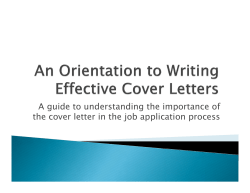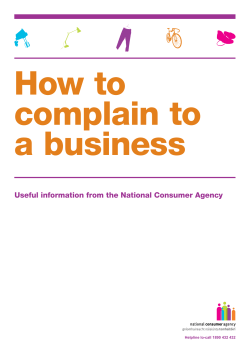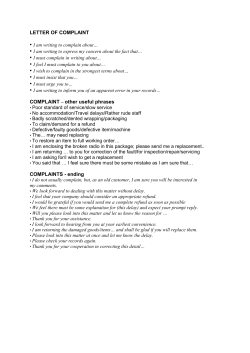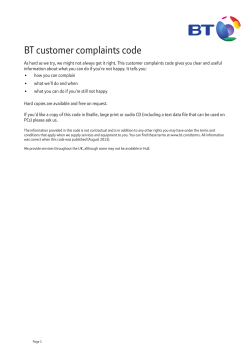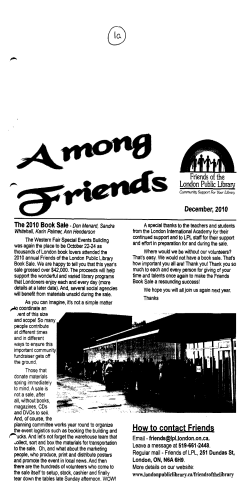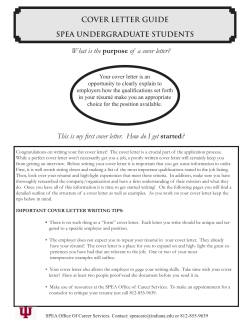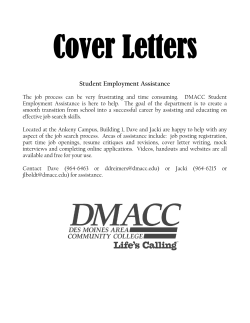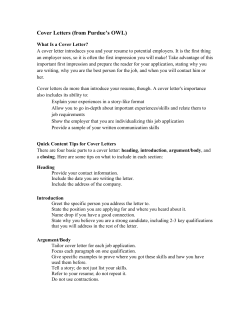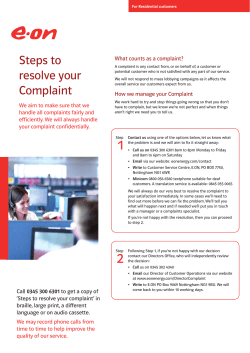
W E- L
W R I TI N G FO RM A L E- M A I L S AND L E T TE RS LEVEL: ADVANCED 2 Formal e-mails and letters are sent to people you don’t know well (e.g. Director of Studies) or people in an official position, when you want to apply for a job or a course, to make a complaint, to ask for information about a trip, etc. They are written in a formal style, in a polite, impersonal tone and they should be printed (not hand-written). Characteristics of formal style: Vocabulary: Use advanced formal vocabulary (don’t use colloquial expressions): I am writing to enquire whether… (NOT: I want to ask if…) Use words of Latin/French origin (not of Anglo-Saxon origin): e.g. investigate (not “research”). Use single-word verbs (not phrasal verbs): e.g. continue (not “go on”). Use formal linkers: consequently, furthermore, however, therefore, for this reason… Use linkers to structure your text: first of all, in addition, finally…: I have worked as a primary school teacher for ten years and therefore have experience working with children. Grammar: Use passive voice: be + past participle: I can be contacted… (NOT: You can contact me…) Use long and complex (subordinate) sentences: You may contact me by telephone at the above number. (NOT: Ring me at the number I’ve given you.) I am writing to apply for the position of part-time shop assistant which was advertised in this week’s edition of the Frankfurt English News. Don’t use the imperative. Punctuation: Use full forms of verbs, not abbreviated forms: I would be grateful if… (NOT: I’d be grateful if…) I would like to apply… (NOT: I’d like to apply…) Don’t use exclamation marks. Structure of formal e-mails and letters: A formal e-mail or letter should consist of: 1. A formal greeting, there are two possibilities: Dear Sir/ Madam, / Dear Sir or Madam, when you don’t know the person’s name. Dear Mr Squires, / Dear Ms Braun, when you know the person’s name, use the title (Mr, Mrs, Miss or Ms, Dr, etc.) and the surname only. 2. 1st paragraph: an introduction in which you write your opening remarks and mention your reason/s for writing. 3. 2nd / 3rd (etc) paragraphs: a main body in which you write the main subject(s) of the email/letter in detail, starting a new paragraph for each topic. 4. Last paragraph: a conclusion in which you write your closing remarks. 5. A formal ending, there are two possibilities: Yours faithfully, when you don’t know the person’s name. Yours sincerely, when you know the person’s name. 6. Your signature and full name: sign your name on the left (use blue or black ink), then print it below the signature. Woodrow Wilson Differences between formal e-mails and formal letters: In a formal letter you write your address (street, city or village, postcode, maybe also telephone number and email address) without your name in the top right-hand corner. Then, skip a line and write the date (on the right and below your address). Write the month as a word (25 April 2010). The date can be written in different ways: e.g. 18th December, 2010 / 18th December 2010/ 18 December 2010. Finally, the address of the person you are writing to should be written on the left, one line below the date. Include the person’s full name (Emily Evans) if you know it, position of the person (The Personnel Manager) and/or name of the company, street, city or village, and postcode. In a formal email you write your email address in the From field, and the email address of the person you are writing to in the To field. Write a subject that will draw the attention of the reader. CARMEN LUISA PÉREZ AMARO 1 W R I TI N G FO RM A L E- M A I L S AND L E T TE RS LEVEL: ADVANCED 2 Letters/Emails applying for a job/course: 1. Introduction: include the name of the job/course, where and when you saw it advertised: I am writing in response to your advertisement on (website) / in (newspaper) … The Evening Standard of 9th May. Application for a job: I wish to apply for the post/position of … office manager with DXW Insurance beginning in June 2010 advertised in … I am writing in connection with the vacancy in your … Sales Department, as advertised in … Tenerife News on/of 20 November. My bachelor degree … combining communication and business courses as well as my work experience prepare me for this position. Application for a course: I am writing to apply for a place on … the Archaeology MA course which commences … this December at … La Laguna University. I would like to apply for admission to the … course. 2. Body paragraphs: in the body of your email/letter you need to match yourself to the company/job or course. Also state your reason for applying/interest in the position/job. You should indicate: Your age, present job and/or studies: I am a nineteen-year-old university student. I am working as a … cook in a school in Santa Cruz. For the last year I have been working as … Two years ago I was employed as … Your qualifications: My academic background includes … a BA in English and Communication with a concentration in … Public Relations. Along with these areas of study, I hold a certificate in … Business, Technical, and Scientific Communication. I have/hold a degree/diploma/certificate in … Media Studies. I have recently finished … secondary school. I have successfully completed a course in… (subject) at … (place). Your experience: summarise pertinent work experience for the job/course. Use the past simple (past jobs), present perfect (recent job) or present continuous (current job). Last winter I was employed as (position)… a cook by (company) in (place) from (date) to (date). I have worked as … an assistant cook in several restaurants in… Puerto de la Cruz for the last … years. At present I am employed/ working as … I have experience … with children/ in public relations. Expertise in the … field has given me a background which I believe could make me effective in your organisation. I was promoted to …department manager in 2008. My position also involves/involved … persuasive selling. My duties include/included … While working with … Dr. Usala Hostetler at the East Carolina University School of Medicine for … the past two years, I have … been part of a team of researchers studying the adrenaline receptor gene and the thyroid receptor gene. I enjoy working ... with DNA research and would like to continue doing so. Skills and personal qualities that are suitable for the job/course (use the present simple): I believe I am suitable for this job because … I enjoy working with children. I also speak some French as well as Italian and English. I consider myself … punctual and responsible. My strengths include … being able to work well with a variety of personalities, to converse with anyone, and to enter easily into new situations with a creative and resourceful attitude. In addition, I am … persistent and punctual. CARMEN LUISA PÉREZ AMARO 2 W R I TI N G FO RM A L E- M A I L S AND L E T TE RS LEVEL: ADVANCED 2 Examples of qualifications: To have a certificate/diploma/degree in … To have the GCSE (= the General Certificate of Secondary Education) To have the A-level (= the Advanced Level General Certificate of Education) To have a Bachelor’s degree in …. awarded by (name of university: La Laguna University) in (year). Examples: a Bachelor’s degree in Business Administration/ Education/ Engineering/ Journalism/ Law/ Mathematics/ Medical Science/ Nursing/ Pharmacy/ Psychology/ Technology/ Veterinary Science … To have a Master’s degree, for example, a Master of Architecture/ of Business Administration/ of Computer Science/ of Education/ of Geography/ of Journalism/ of Laws/ of Mathematics/ of Music/ of Psychology/ of Sports Science… (For more, visit: http://en.wikipedia.org/wiki/Master's_degree) To have a PhD degree (when you write a thesis). Examples of skills: To have a driving licence, a good level of (written/spoken) English, computer skills, good communication skills … To be a good cook/ dancer, computer-literate… To be able to work under pressure. Examples of personal qualities: To be articulate (=speaks well and clearly), cooperative, creative, dedicated, disciplined, energetic, enthusiastic, flexible, good at … (listening to people, sport), hard-working, honest, imaginative, mature, open-minded, outgoing, patient, physically fit, polite, punctual, responsible, reliable, sociable, understanding, talented, tolerant, well-organized, well-groomed (=clean and pleasant appearance)… To like helping people, working with children, working as part of a team, working by yourself… 3. Last paragraph: Application for a job: say when you are available for interview, state that you have enclosed your CV, where and when you can be contacted, a remark that you hope your application will be considered…: I will be available for interview in … April/ any weekday morning. I would be happy to supply you with further information at an interview. I am looking forward to meeting you and learning more about your organisation and the challenges of the position you advertise. I may be contacted at the above address or by telephone on/at … 660 356903. The best times to contact me by phone are … Tuesdays or Thursdays before noon or after 3:30 pm. I enclose/attach my CV (BrE)/ resume (AmE) and references from … my last two employers. I look forward to hearing from you in due course. Application for a course: I enclose a detailed curriculum vitae in the hope that you will consider my application for entry. Should you need to contact me, the best times are between 8 and 11 am or after 2 pm on/at 252758-0016. You can also contact me at [email protected]. Please find enclosed a copy of my degree/diploma. Please contact me if you need any more information. I hope that my application will be taken into consideration. Letters/Emails of request: A formal letter of request is written to ask for permission, help, information, advice, etc. 1. Introduction: state the reasons for writing. For example, if you are asking for information about something (a job, a competition, a course, a hotel…), you should first state the reasons for writing, i.e. say what kind of information you want. I am writing with reference to … your advertisement in the newspaper yesterday. CARMEN LUISA PÉREZ AMARO 3 W R I TI N G FO RM A L E- M A I L S AND L E T TE RS LEVEL: ADVANCED 2 I am writing to request that … you consider the possibility of placing special bins in the local area as I feel this would encourage recycling. To ask for permission: I am writing to ask if I might be permitted to … To ask for help: I wonder if you could possibly… send me some of your brochures outlining any package holidays that you offer for large groups. I am writing to ask if you would be so kind as to… To ask for information: I am writing to inquire about… / to inquire if you could possibly tell me… I am interested in … an intensive course and I would be grateful if you would send me further information. To ask for advice: I am writing to ask if you could help me with… I would appreciate it if you could give me some advice about … 2. Body paragraphs: explain the reasons for making the request. First of all, I would like to know a little more about … the courses. Your advertisement says that … it is for young people. But could you please tell me ... how old I must be to apply? In addition, I would appreciate more information about … the length of the courses. Please could you also send me… ? I also require information on … the cost of the course, when it will commence and how long it is likely to last. Finally, I would appreciate it if you could … send me an application form. 3. Last paragraph: I would appreciate it if you could inform/help me as soon as possible. I would appreciate it if you could give me your advice/permission as soon as possible. I look forward to receiving… your advice. I look forward to hearing from you at the address above or by telephone on/at … 660 21 22 48. I hope that my request will not inconvenience you too much. Thank you in advance for your help. / I would like to thank you in advance. Letters/ Emails of complaint: A letter/email of complaint is written to complain about a problem which has arisen (faulty merchandise, rude staff, inaccurate information, etc.). It should explain the reason/s for the complaint, supported with a justification, and usually includes a suggestion/demand concerning what should be done (e.g. refund, compensation, apology, etc.). 1. Introduction: introduce your complaint (explain what has happened, where, when, etc.) and your justification: Complaint: I am writing to complain about/regarding … the product I received from your company on 20 April. I am writing to you in connection with/ with reference to … I am writing to express my dissatisfaction with… Stronger opening remarks: I am writing to express my strong/extreme dissatisfaction with… the treatment I received at Stimson’s Electronics yesterday afternoon. I am writing to express my disgust at … the appalling treatment I received while staying at your hotel. CARMEN LUISA PÉREZ AMARO 4 W R I TI N G FO RM A L E- M A I L S AND L E T TE RS LEVEL: ADVANCED 2 Justification: I was promised that ... but... I was told it would... However, ... I have only used it three times. Yesterday I was shocked to find that ... it did not work, especially as it cost €650. Although you advertise “top quality”, I felt that the product I purchased was below the standard I expected. 2. Body paragraph/s: explain your problem, present each of the specific points you are complaining about. Start a new paragraph for each point and justify these points by giving examples or reasons. X does not function in spite of the fact that I purchased X only a month ago. You said it was guaranteed to function properly for five years. I was deeply offended by the behaviour of… the sales assistant when I went to the shop to complain. He was impolite and unhelpful. To start listing your complaints you can use: Firstly, In the first place, To start with, To begin with. To add more complaints you can use: What is more, In addition (to this), Furthermore, Moreover, Besides, Apart from this, To make matters worse… Linking words that express contrast are very frequent here, in order to link each of the points with their justification: however, nevertheless, although, even though, but, despite the fact that, in spite of the fact that… The local council encourages us to protect the environment and take our bottles, paper and plastic containers to a recycling depot. However, the nearest recycling depot is about five kilometers from my home. My 2-year-old daughter cut herself on the toy even though you claim it is safe for children over 18 months. Although I have only used the automatic tin-opener once, it no longer works. I have written to you twice but you have not taken any action. The shirt’s bright red collar has turned pink, despite the fact that the label states that it can be washed at high temperatures without the colours fading. I still haven’t received the goods I ordered in spite of the fact that I sent you a cheque three weeks ago. 3. Conclusion: explain what you expect to happen (e.g. to be given a refund/ replacement/ apology…). Surely the best solution is to … put recycling depots at the end of every street so that people can use them easily. I hope you will … replace …/… deal with this matter quickly. / … resolve this matter quickly. I would be grateful if you could send me another… If this is not possible, I would like a full refund of my money as soon as possible. I trust the situation will improve. I feel that I am entitled to compensation/ a refund/ a replacement. I hope we can sort this matter out amicably. I expect to hear from you as soon as possible. Stronger closing remarks: As you can imagine, I am extremely upset. I demand a full refund/an immediate replacement/ a written apology from the local manager. I insist you replace the item at once. I insist upon full compensation or I will be forced to take this matter further. I hope that I will not be forced to take further/legal action. Last lines: I look forward to hearing from you at your earliest convenience. Thank you for your help with this matter. Thank you in advance. CARMEN LUISA PÉREZ AMARO 5 W R I TI N G FO RM A L E- M A I L S AND L E T TE RS LEVEL: ADVANCED 2 Letters/Emails to the authorities/editor: These letters/emails express a person’s concern about and views on a certain matter and usually contain suggestions on how to tackle a problem. You need to state the nature of the problem and its causes and effects. 1. Introduction: I am writing to draw your attention to… the dangerous state of the road junction between … in the village of… I am writing to express my approval/disapproval of… the plan to build a motorway near… I am writing to support …/ protest about… 2. Body paragraphs: To express your opinion: In my opinion, I feel/think … The basic problem is … I am totally opposed to… / I am totally in favour of… One solution to the problem would be to… In addition to this, … / Furthermore,… To express cause: Owing to the fact that.../ Due to the fact that...there is no safe place to cross, several children have been injured in minor accidents. To express effect: Therefore, / so/ consequently, / as a result, / as a consequence, / for this reason... 3. Last paragraph: I hope you will give this matter careful consideration … and that suitable measures will be taken before more accidents occur. I look forward to hearing from you. CARMEN LUISA PÉREZ AMARO 6
© Copyright 2026


